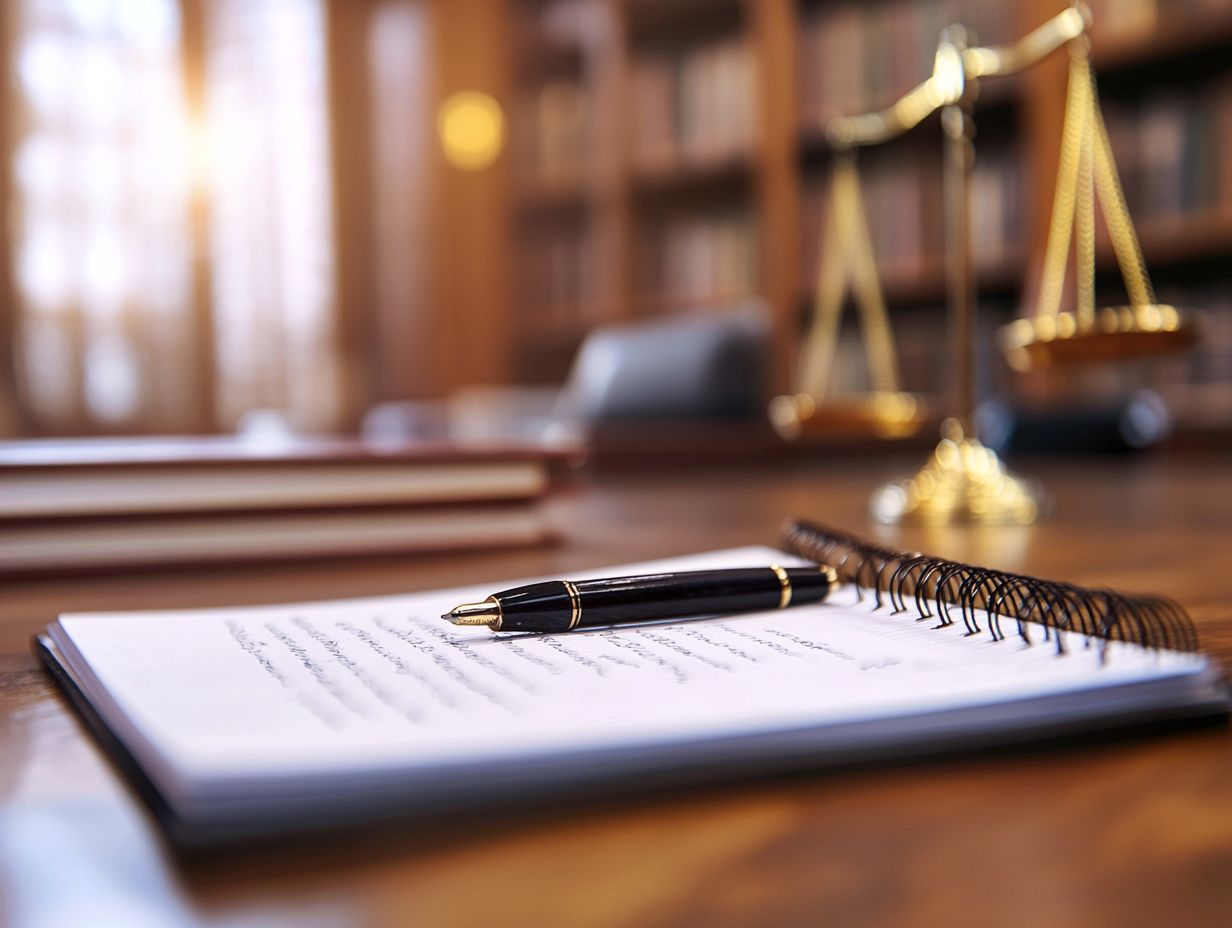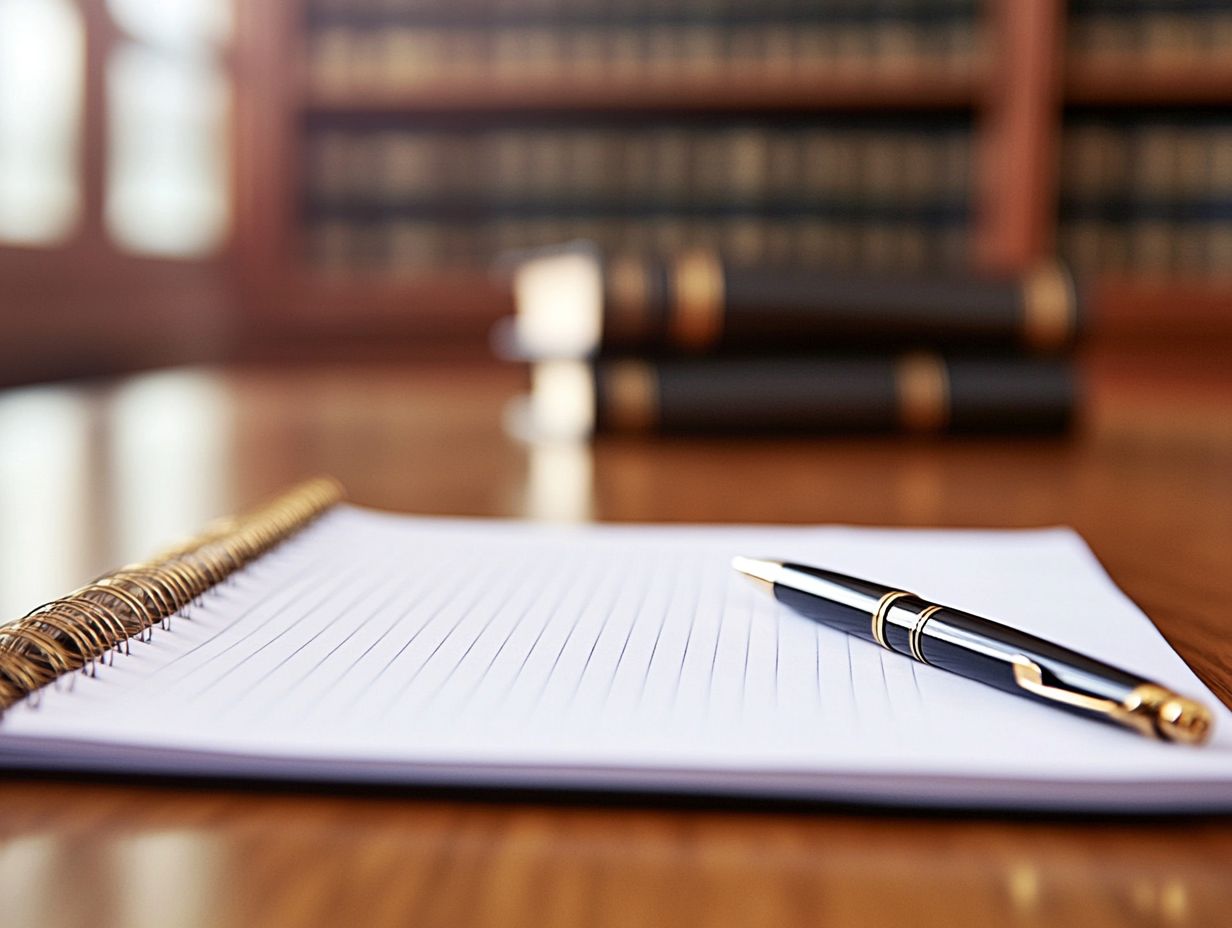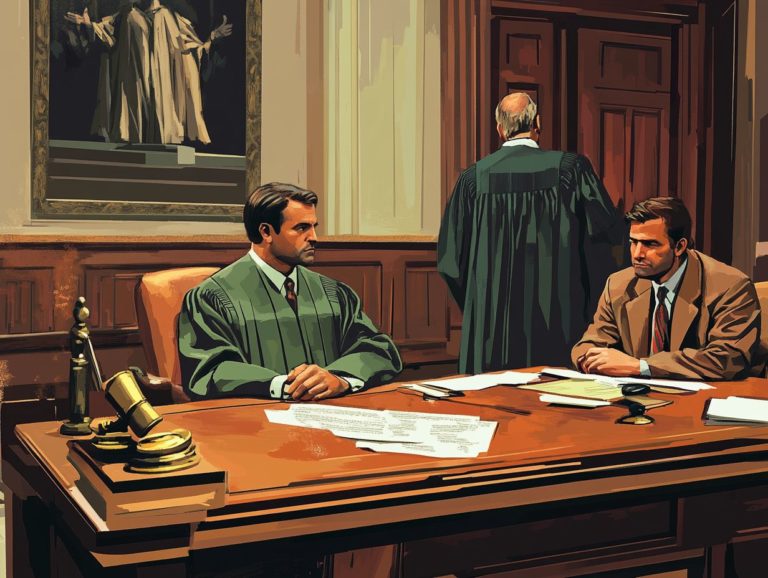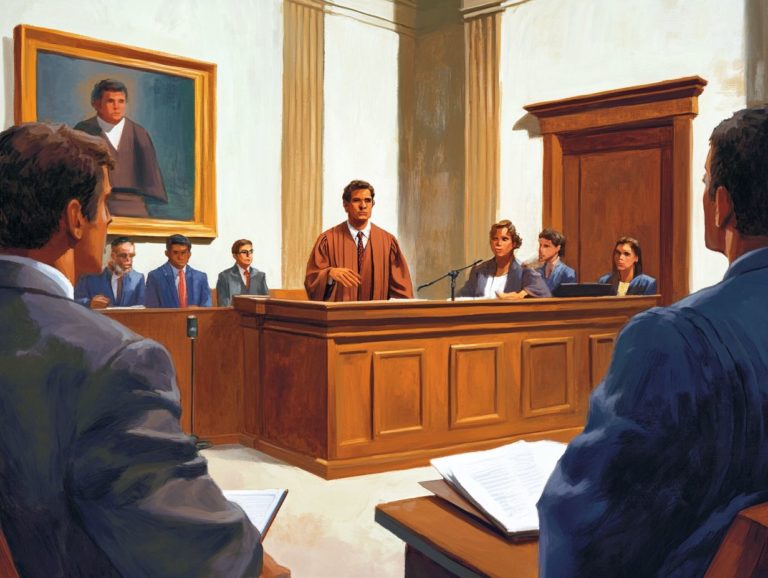What Are the Most Important Questions to Ask Your Lawyer?
Hiring a lawyer is a pivotal decision that can significantly influence the outcome of your case. By asking the right questions, you can identify a legal partner who not only meets your needs but also understands your unique situation.
This guide presents essential inquiries to consider before, during, and after your legal journey. From evaluating their experience and communication styles to understanding costs and strategies, being well-prepared sets the stage for more favorable outcomes.
Equip yourself with the knowledge necessary for effective legal representation, ensuring you make informed choices every step of the way.
Contents
- Key Takeaways:
- Questions to Ask Before Hiring a Lawyer
- Potential Outcomes and Next Steps
- Questions to Ask Throughout Your Case
- Questions to Ask Before Settling or Going to Trial
- Frequently Asked Questions
- What are some general questions I should ask my lawyer?
- What should I ask my lawyer about their fees?
- What information should I provide to my lawyer?
- What should I ask my lawyer about their strategy for my case?
- What questions should I ask about the potential timeline for my case?
- What should I ask my lawyer about potential risks or drawbacks of my case?
Key Takeaways:

Before hiring a lawyer, ask about their experience and specialization to ensure they are the right fit for your case. Communication and availability are key factors in a successful lawyer-client relationship. Ask about their preferred method of communication and how often you can expect updates.
Throughout your case, stay involved by asking your lawyer for progress reports and staying informed about any changes in strategy or approach. This will ensure that you are on the same page and can make informed decisions together.
Don t wait! Ask the right questions to secure the best representation possible.
Why Hiring a Lawyer is Important
Hiring a lawyer is essential when you re dealing with legal issues, particularly in personal injury cases where their expertise can truly shape the outcome. A qualified attorney brings years of experience and a strategic mindset, ensuring that every legal detail is meticulously managed.
They represent you during negotiations, litigation, and court appearances. With a deep understanding of the law and a knack for effective communication, your lawyer will play a key role in securing favorable settlements and safeguarding your rights.
The labyrinth of personal injury law can feel overwhelming, filled with various procedures, regulations, and timelines that may be new to you. Their proficiency in assessing damages allows them to explore all possible compensation avenues, from medical expenses to lost wages.
A good lawyer will explain how their fees work and help you understand the impact of your choices. By crafting tailored strategies based on their extensive knowledge, they strive to ease the stress of litigation and enhance your overall experience, making them invaluable partners in your pursuit of justice.
Questions to Ask Before Hiring a Lawyer
Before you hire a lawyer, it s essential to ask pointed questions that reveal their qualifications and how well they align with your specific case needs. Prepare these questions ahead of time to make the most of your consultation.
Gaining insight into their experience with personal injury cases, their communication style, and how much you will pay for their services can greatly influence your legal journey. This consultation phase is crucial for building a solid attorney-client relationship, ensuring clarity and transparency regarding the services and strategies they provide.
Experience and Specialization
Your lawyer’s experience and specialization in personal injury law can significantly impact the success of your case, as these qualities directly relate to an attorney’s ability to navigate complex legal terrains effectively.
A skilled lawyer possesses a deep understanding of the specific laws and regulations relevant to your case type, allowing them to craft tailored strategies that aim for the most favorable outcomes. This specialization also enhances their negotiation skills, boosting the likelihood of securing optimal settlements.
An experienced attorney is equipped to handle various personal injury cases, from car accidents and workplace injuries to medical malpractice and product liability disputes. Understanding the intricacies of courtroom dynamics is essential, as it enables them to present compelling arguments that resonate with judges and juries.
Their familiarity with procedural nuances and evidence presentation can significantly shape the case s trajectory. By employing customized approaches that reflect the unique aspects of each situation, you stand to benefit from a robust legal strategy designed specifically for your needs, ultimately increasing the chances of a successful outcome.
Communication and Availability
Effective communication and availability are essential when selecting a lawyer. They ensure you remain informed and engaged throughout your legal journey.
A responsive attorney cultivates a strong relationship with you. This promotes clear discussions about case updates, strategies, and potential outcomes.
Transparency builds your trust. It also helps you make informed decisions about your case.
In this ever-changing landscape, regular updates and open dialogues are crucial for achieving the best legal outcomes. When an attorney prioritizes ongoing communication, you ll feel enabled to express your concerns and preferences. This can significantly influence the direction of your case.
Engaging in transparent conversations allows both you and your attorney to align expectations. This fosters a collaborative atmosphere. Such rapport ultimately enhances the attorney-client relationship, simplifying the navigation of complexities and allowing for adjustments in strategies as needed. This paves the way for a more favorable resolution.
Cost and Payment Structure

Understanding the cost and payment structure of legal services is crucial when hiring a lawyer. These factors significantly impact your overall budget for representation.
Many personal injury attorneys operate on a fee that only applies if you win your case. This aligns their interests with yours and alleviates your financial concerns. You can focus on your case without the burden of upfront fees.
It’s essential to recognize that not all attorneys use contingency fees. Some charge hourly rates and bill you for the time spent on your case. Others may require retainer agreements, which involve a lump sum paid upfront for legal services.
Each of these structures has its pros and cons. Discuss costs upfront with potential lawyers. Understand your payment options now to avoid surprises later!
By ensuring transparency about costs, you can establish a trusting relationship with your attorney. This enables you to make informed choices regarding your legal representation.
Questions to Ask During Your First Meeting
In your initial meeting with a lawyer, asking the right questions is crucial for gaining valuable insights. This helps you understand their approach and the trajectory of your case.
Inquire about their case evaluation process, strategic planning, and potential outcomes. This conversation will illuminate their methodologies and lay the foundation for a fruitful attorney-client relationship.
Case Evaluation and Strategy
During your initial consultation, a thorough evaluation of your case is essential. This helps determine the most effective legal strategy tailored specifically to your personal injury claim.
An experienced lawyer will carefully assess the specifics of your situation. They will consider the available evidence and the strengths and weaknesses of your position to craft a comprehensive approach aimed at achieving favorable outcomes.
Planning your strategy is key to setting realistic expectations and preparing for challenges. Your attorney will meticulously review documents, witness statements, and medical reports to gauge the viability of your case.
By identifying key evidence that supports your claims, they can also highlight areas that may require further investigation. This detailed analysis aids in formulating robust legal arguments and may lead to proposing effective negotiation strategies for settlements or preparing for court, if necessary.
Understanding the potential pitfalls and vulnerabilities in a personal injury case is vital. It enables you to adjust tactics designed to counter opposing arguments, ultimately optimizing your chances of a successful resolution.
Potential Outcomes and Next Steps
Understanding the potential outcomes of your case is crucial. It sets the stage for the next steps in your legal journey.
An experienced attorney will lay out likely scenarios, including the possibility of negotiation, settlement discussions, or litigation.
This insight helps you make informed decisions about your options. It allows you to strategize for the best possible outcomes.
By clearly distinguishing between pursuing a settlement and taking the matter to court, your legal representative equips you with the knowledge to make better choices.
Each pathway presents its own risks, rewards, and timelines. These factors contribute to your overall legal strategy.
When you grasp the implications of your decisions, you can communicate your preferences and expectations more clearly. This leads to a more customized approach in building your case.
This collaboration fosters trust and open dialogue. These elements are essential for ensuring that your interests remain front and center throughout the process.
Questions to Ask Throughout Your Case
As your case unfolds, it s crucial to ask relevant questions throughout the legal process. Staying engaged with your lawyer keeps you informed.
Inquiries about case updates, progress reports, and shifts in strategy are essential. They help you maintain a clear grasp of your position and the steps being taken to secure the best outcomes.
This proactive approach keeps you in the loop and strengthens your bond with your lawyer.
Updates and Progress Reports

Regular updates and progress reports from your lawyer are vital for maintaining transparency. These communications ensure you re always informed about significant developments and next steps in your personal injury claim.
A proactive attorney will prioritize this aspect of the relationship, fostering trust and confidence.
Effective communication plays a pivotal role in helping you understand the intricacies of your case. This enables you to make informed decisions as the process unfolds.
By consistently sharing information and addressing your concerns, your lawyer dispels uncertainties and makes you feel valued and involved in your journey toward resolution.
This level of engagement can significantly alleviate anxiety. It demonstrates that a supportive attorney-client dynamic is crucial in navigating the complexities of personal injury claims.
Developing such a rapport cultivates a sense of security and encourages you to openly communicate your needs and expectations.
Changes in Strategy or Approach
Staying alert to changes in your lawyer’s strategy can be a game-changer for your case! An experienced attorney will keep you informed when adjustments are necessary.
These changes may arise due to new evidence, shifting negotiation dynamics, or developments in litigation.
Understanding these changes prepares you to respond effectively. It aligns your expectations with your attorney’s methods.
This awareness is especially vital during critical phases such as discovery or settlement discussions, where the landscape can shift dramatically.
You might navigate unexpected twists that could alter the trajectory of your case. Anticipating the need for adjustments aids in decision-making and strengthens your collaboration with your legal counsel.
By staying engaged and open to the rationale behind strategic modifications, you can better position yourself for potential outcomes.
Ensure your concerns are addressed in harmony with the overall litigation strategy.
Questions to Ask Before Settling or Going to Trial
Before you decide whether to settle or go to trial, engage your lawyer with specific questions. This can shed light on the advantages and disadvantages of each option.
Grasping the potential outcomes of a settlement compared to the unpredictability of a trial can significantly influence your decision-making journey.
An experienced attorney will offer valuable insights into the negotiation tactics at play and the complexities of court proceedings. This ensures you have all the information you need to make an informed choice.
Settlement Options and Negotiations
Exploring settlement options and negotiations is a key moment in personal injury cases. This phase can dramatically influence the final outcomes. An experienced lawyer will evaluate your case and guide you through potential settlement offers, helping you weigh the benefits of accepting a deal against the risks of diving into litigation.
By understanding this process, you can make informed decisions that truly align with your best interests. The settlement options available to you include direct negotiations, mediation, and occasionally arbitration. Each of these offers distinct advantages based on the particulars of your case. Mediation, where a neutral third party helps negotiate a settlement, can be particularly beneficial.
During negotiations, parties often assess crucial factors such as the strength of the evidence, potential juror perceptions, and the overall legitimacy of the claims involved. These elements can profoundly steer their strategies.
A nuanced legal strategy boosts your chances of securing a more favorable settlement. This approach allows you to better evaluate when to compromise and when to stand firm, ultimately shaping the trajectory of your case toward the best possible resolution.
Trial Preparation and Potential Outcomes
Trial preparation is an intensive endeavor requiring meticulous planning and strategizing to secure the best possible outcomes for your case. As your attorney gathers evidence, prepares documentation, and crafts a compelling strategy for court, it s vital for you to understand the potential outcomes of a trial, including both the risks and rewards.
This knowledge is crucial as you navigate this pivotal stage in your personal injury claims. Several key elements come into play during this phase, such as preparing witnesses, securing expert testimonies, and dissecting the opposing party’s arguments.
Each piece of evidence must be evaluated critically for its relevance and strength, as this can significantly sway the judge or jury’s decision. You need to weigh the likelihood of achieving a favorable verdict at trial against the option of settling, often considering factors like financial costs, time commitments, and the emotional toll that litigation may impose.
A well-rounded approach to trial preparation not only enhances your chances of victory but also informs your decision-making process. This ensures you are thoroughly equipped to confront whatever challenges lie ahead in the courtroom.
Frequently Asked Questions

What are some general questions I should ask my lawyer?
- What is your experience with cases like mine?
- How will you communicate with me during the legal process?
- What are the potential outcomes of my case?
What should I ask my lawyer about their fees?
It is important to discuss fees and payment with your lawyer. Ask about their hourly rate, if they charge a retainer fee, and how costs such as filing fees and court costs will be handled.
What information should I provide to my lawyer?
Your lawyer will need all relevant information about your case. This may include documents, witness statements, and any other evidence or information you have. It is important to be honest and transparent with your lawyer.
What should I ask my lawyer about their strategy for my case?
It is important to understand your lawyer’s approach to your case. Ask about their strategy, potential challenges, and how they plan to handle them. Make sure you are comfortable with their approach before moving forward.
What questions should I ask about the potential timeline for my case?
Your lawyer should be able to provide an estimate of how long your case may take. Ask about the potential timeline, any potential delays, and how you will be kept updated on progress.
What should I ask my lawyer about potential risks or drawbacks of my case?
It is important to understand the potential risks and drawbacks of your case. Ask your lawyer about any potential challenges or weaknesses, and how they plan to address them. Being aware of potential risks upfront is better than being surprised later on.






